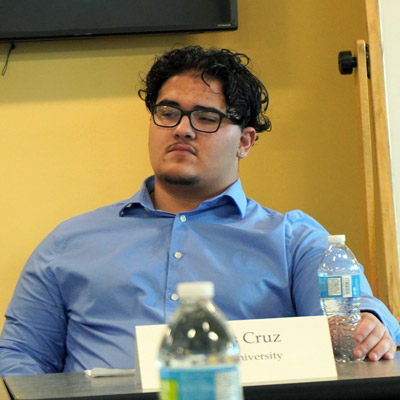Grandville — “If nobody wants to teach, then who’s going to get educated?”
The question came from East Kentwood High School teacher Carl Warfield, and it got to the heart of a recent discussion about the teacher shortage, led by state Senate Majority Leader Winnie Brinks and state Rep. Carol Glanville at Grandville Public Schools.
During the talk, representatives from Grandville, Wyoming and Kentwood school districts, Kent ISD, Calvin University and Grand Valley State University joined Brinks and Glanville to explore ideas for making teaching more appealing, addressing recruitment and retention issues, and the importance of diversity in the classroom.
Daniel Williams, Steelcase Foundation president and a former principal for Grand Rapids Public Schools, moderated the conversation.
‘Let the teachers do what they do.’
— State Rep. Carol Glanville

More Pay, More Diversity
The issue of pay came up frequently. Warfield stressed that teaching is an immensely rewarding profession, and that it’s important to curb perceptions to the contrary. He said he often hears students talk about how “teachers don’t make any money,” and the sentiment usually originates at home.
“Ask your mom and dad, then, who’s going to be in the classroom for your kids?” Warfield said.
But compensation is a real concern, and it can be a deterrent, particularly among minority populations, said Carlos Cruz, a Calvin student pursuing a degree in education. He came to the Grand Rapids area from Cuba in 2013, and attended Wyoming Public Schools.
“People of color, obviously, they experience a lot of hardships in life,” he said. “Immigrant teachers … are hard to get, because of their past issues with money.”
Carlos said his family is concerned that his pay won’t be sufficient once he enters the field in earnest.
“They wanted me to be able to excel and be able to make money, and they didn’t think education would be something I could make money with,” he said. “I still get pushback from people around me about the salary.”
Carlos said he isn’t in it for the money, but he’d still like to cover the cost of his education. He’d also like to see more diversity in the classrooms.
“Obviously there’s not a lot of minority representation in education,” he said. “Every school wants people that look like their students to represent their schools. As a student, if I’m able to see teachers in my classroom that have experienced the same things I have, and have gone through the same hardships … I think that can only boost my knowledge that I’m going to be able to get from them what they’re teaching me.”

Teacher Prep is a Plus
Wyoming’s Educators Rising teacher prep program helped Carlos solidify his interest in education. He said similar programs need to be nurtured at other school districts.
Brinks agreed, stating after the discussion that the need for early exposure to education is a clear priority. Experience in the classroom for high school students and prospective teachers provides a sense of what it’s like to be a teacher including challenges, rewards and opportunities.
“One of the big takeaways is (the need for) helping our systems better prepare teachers of the future,” she said.
The group learned about the recently launched West Michigan Teacher Collaborative, which is using a $19 million grant to help attract new teachers, and clear a path for certification and advanced degrees for people already in the profession.
The grant is one of many efforts to address the teacher shortage, but more needs to be done, according to Glanville.
Freedom and Flexibility
Glanville, a former educator herself, said it’s important to trust that teachers know how to do their job, and give them the freedom to do it.
“One of the things that came up here is … that piece about autonomy, and that teachers are allowed to be the experts they are and to teach to the kids how they learn best,” she said.
‘Every school wants people that look like their students to represent their schools.’
— Calvin University student Carlos Cruz
The idea is that giving teachers more freedom will help keep them in the profession. Glanville said lack of flexibility is one of the reasons why she left the field.
“Let them do their job, that they’re professionals and experts in,” she said. “It gets back to that dignity piece. … We expect so much of our teachers in terms of ongoing education and everything else, and they’re happy to do it. … But they’re doing it and it’s not being recognized as advanced expertise. So, let the teachers do what they do.”
Read more from Grandville:
• ‘The universe just has its way of aligning’
• Welcome, class of 2036









